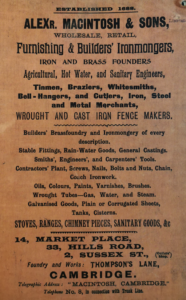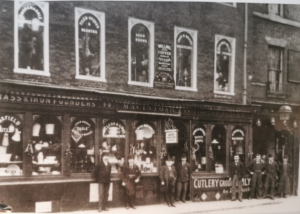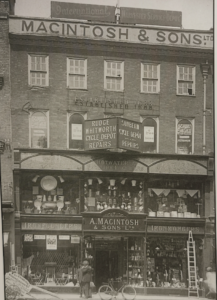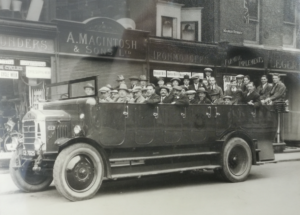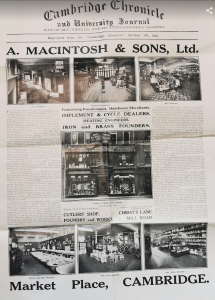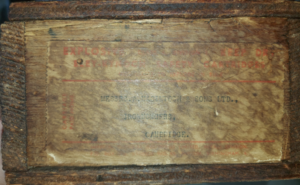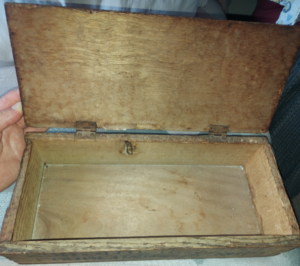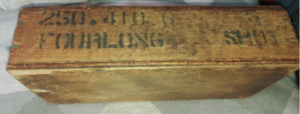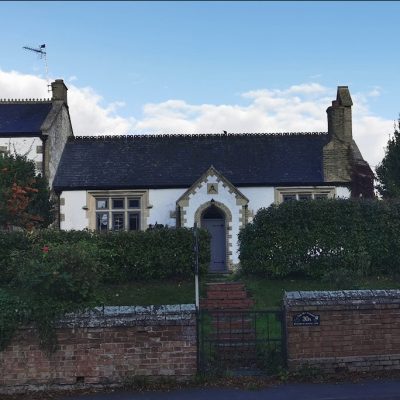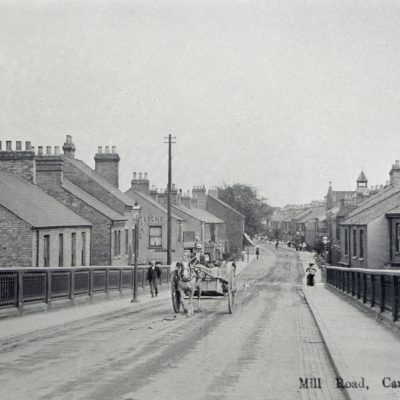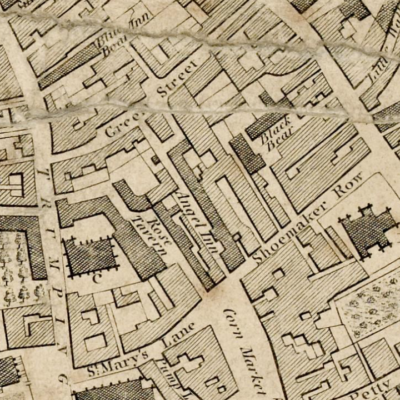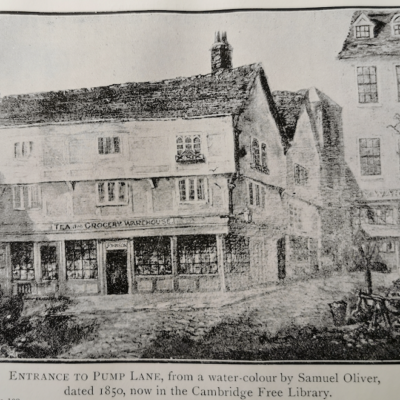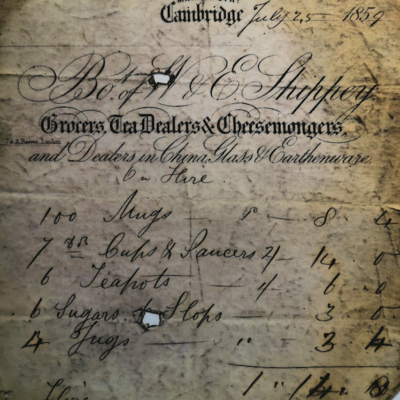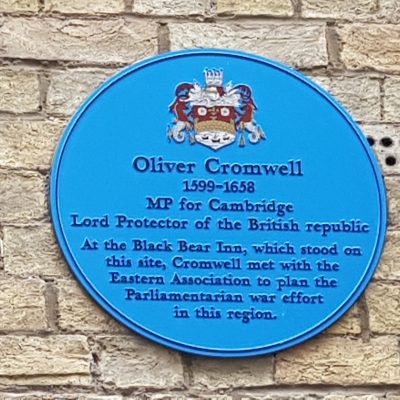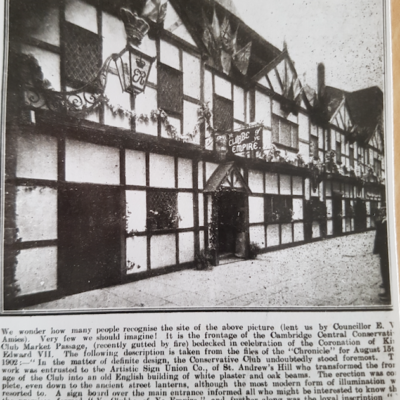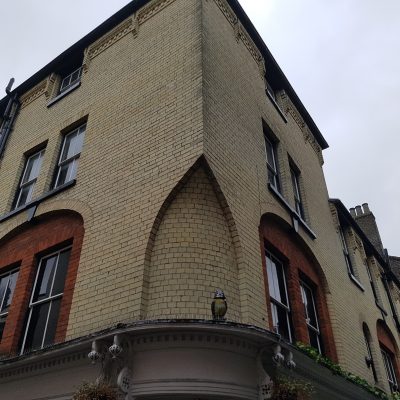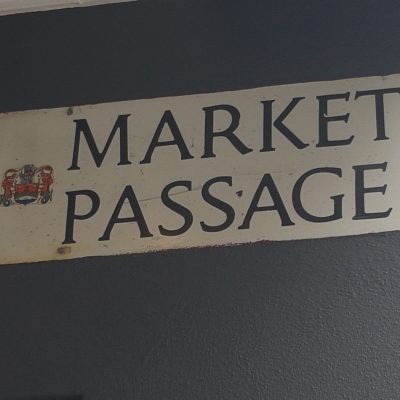Search by topic
- archaeology
- architecture
- bricklayer
- Building of Local Interest
- carpenter
- church
- crime
- dressmaker
- fire
- Great Eastern Railway
- listed building
- medieval
- oral history
- Public House
- Rattee & Kett
- Religious House
- Roman
- scholar
- school
- Then and Now
- tudor
- women
- work
- world war one
- world war two
Search by text
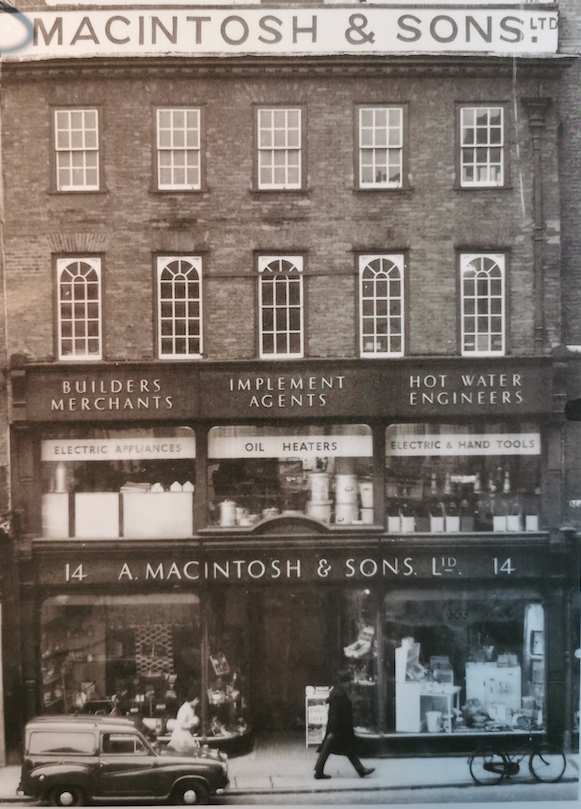 14 Market Hill, Macintosh and Sons (MoC19/62)
14 Market Hill, Macintosh and Sons (MoC19/62)14 Market Hill
History of 14 Market Hill
According to 1959 Royal Commission on Historical Monuments Survey of Cambridge, a four storey house. The south front an early 18th century remodelling and heightening of an earlier structure. In the process the carriageway, presumably to the Angel Inn as shown in William Custance’s map of 1798, was destroyed.
The ironmongery here was founded in 1688. When Swann Hurrell took over the business from his uncle in 1847 he moved the foundry to a disused brewery on Quayside.
1688
William Finch ironmonger took over premises. Four generation of Finches followed
1841
Swann Hurrell, 20, ironmonger [son and nephew of the Finch family. He was to inherit the Finch ironworks]
Catherine Frances, 45 [mother and widow]
Anna, 14
Mary Cooper, 38, servant
Elizabeth Cooper, 20, servant
James Chapman, 17, servant
James Hart, 19, servant
In 1851 Swann Hurrell is at 7 Market Hill
Catherine Frances née Finch was the daughter of Charles Finch II and sister of Charles Finch III. She died in 1849.
1851
Thomas Edward Chisholm, 49, yeoman, b London
Mary Ann, 47, b Cambs
Thomas Donkin Chisholm, 25, b Cambridge
Mary Ann, 22, b Cambridge
Henry Edward, 18, b Cambridge
Thomas, 71, father, b Cambridge
Mary Ann, 50, b Cambridge
Hannah Donkin, mother in law, 79, b Durham
Jane Donkin, sister in law, 45, b Darlington
Caroline Donkin, sister in law, 35, b Darlington
Mary Ann Fisk, visitor, widow, 26, b Devon
1861
William Rowton, 41, ironmonger’s clerk, b Cambridge
Mary, 51, b Cambridge
Hannah Ayres, 20, servant, b Bottisham
Hurrell’s Yard:
(1)
Henry Ed Chisholm, 53, yeoman, b London
1870
Swann Hurrell was succeeded by his nephew Edward Beales.
1871
(occupied as a shop)
1881
1884
Alexander Macintosh bought the bankrupt ironmongery business of Edward Beales and moved to 14 Market Hill. They already had premises at 21 and 23 Market Street, 2 Sussex Street, 49 Sidney Street and 54a Hills Road. At about this time they also bought the Thompson’s Lane Foundry.
1891
1900
CC&J 27.4.1900: Case of theft of tools and money by Joseph Ryder of 177 Gwydir Street. Found guilt and given three months with hard labour.
1901
In this year the Macintosh shop front was renewed and the whole shop refitted by Frederick Sage & Co.
(14 1/2)
Sarah Warboys, 54, housekeeper, b Oakington
Sarah M Potter, 25, servant, b Derbys
Ada E Ginn, 23, servant, b Cambs
Louisa Nunn, 15, servant, b Cambs
Fred Williams, 21, boarder, draper’s assistant, b Cambs
Henry Beale, 28, boarder, draper’s assistant, b Herts
Ernest Dinnage, 26, boarder, draper’s assistant, b Surrey
Arthur W Rutt, 29, boarder, draper’s assistant, b Cambridge
Charles L Rutt, 30, boarder, furnisher’s assistant, b Cambridge
James Hanks, 23, boarder, draper’s assistant, b Middlesex
Thomas H Mason, boarder, 29, draper’s assistant, b Waterbeach
Graham Fuller, 22, boarder, draper’s assistant, b Norfolk
Albert Geeson, 35, boarder, draper’s assistant, b Hunts
Henry E Philips, 23, boarder, b Devon
1906
(14a)
Arthur W Hutt
[He had lived previously at 35 Bridge Street. He was living at this address at the time of his marriage in 1906 and then moved to 109 Mawson Road.]
1908
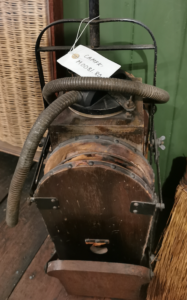
Harvey’s Folding Pre-Electric vacuum cleaner c.1908, sold by Macintosh and Son © Museum of Cambridge
1913
A Macintosh & Sons, Ltd, ironmongers, engineers, founders and implement makers
5/2/1930: The novel sight of people being lowered from an upper window of Messrs Macintosh’s establishment in Market Street Cambridge by means of a new automatic fire escape has attracted considerable attention. The escape consists of a small metal box containing geared mechanism through which runs a steel cable with a safety belt fixed at each end. It can be fixed to the wall inside the window. The belt is placed round the body, under the arms and the person is lowered to the ground automatically at the rate of two feet per second. Most of the colleges have been equipped with it. Anybody desirous of testing the escape can do so and already a number of people, including one of the CDN photographers have done so. (Cam.News)
1921
1925
1927
A Macintosh bought 14A Market Hill from Eaden Lilley in exchange for the sale of part of the yard and iron warehouse at 28 and 29 Green Street.
1962
A Macintosh & Sons Ltd, ironmongers. The firm went into voluntary liquidation in this year.
Premises were demolished soon after

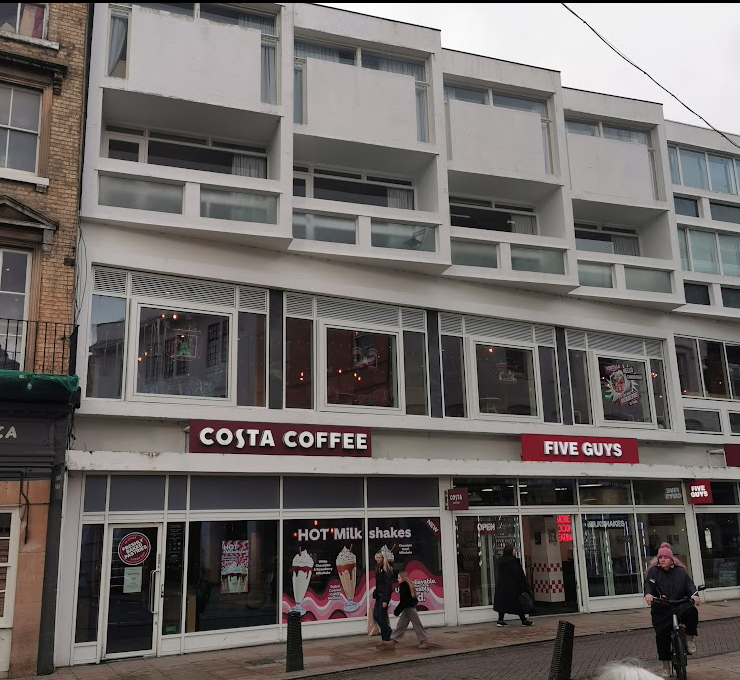
Contribute
Do you have any information about the people or places in this article? If so, then please let us know using the Contact page or by emailing capturingcambridge@
License
This work is licensed under CC BY-NC-SA 4.0








